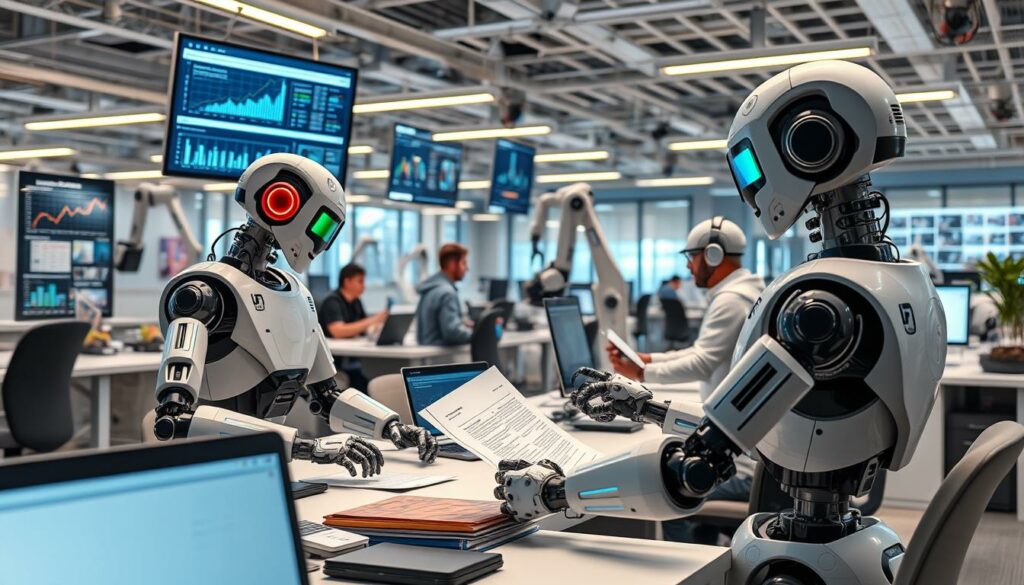In today’s world, digital transformation is crucial, not just an option. Intelligent process automation (IPA) stands out as a game-changer for companies worldwide. It combines artificial intelligence (AI), machine learning (ML), and automation to boost efficiency in the modern workplace. IPA changes how we handle routine tasks and manage important business processes with smart process automation.
The advantages of embracing this innovation are clear. Automated document processing errors drop by as much as 80%. Similarly, smart document management increases productivity by 50%. And, automated time tracking provides accurate real-time work hours, reducing mistakes significantly. Using tools like ABBYY Intelligent Process Automation, firms see quicker operations and faster reporting.
Adopting advanced technology boosts efficiency and saves money right away. It helps businesses stay flexible and meet their customers’ changing needs. This is in line with ABBYY’s goal to lead the IPA market with its expertise and ongoing innovation, built over thirty years.
Key Takeaways
- Intelligent process automation is an indispensable asset for businesses pursuing digital transformation and streamlined operations.
- IPA unites AI, ML, and robotic automation to augment human capabilities and automate tasks.
- Significant improvements in productivity and efficiency are realized through error reduction and enhanced document processing with IPA technologies.
- ABBYY, a forerunner in the IPA space, propels businesses forward with pre-built document skills and advanced process analytics.
- From banking to healthcare, diverse industries are harnessing IPA for superior operational outcomes and decision-making prowess.
Understanding Intelligent Process Automation
In the world of business tech, Intelligent Process Automation (IPA) changes things up. It combines AI, machine learning, and robotics to make work smoother. This mix boosts efficiency and helps companies keep up with market shifts.
Defining Intelligent Process Automation (IPA)
IPA brings together cognitive automation, machine learning, and robots. It lets systems do complex tasks well without much human help. This tech works with all kinds of data, making decisions quickly and accurately.
The Strategic Necessity of IPA in Modern Business
With the business world getting tougher and demands growing, using tech like IPA is key. It cuts mistakes and costs. Plus, IPA grows and learns on its own, adjusting to new needs.
IPA: A Blend of AI, Machine Learning, and Robotic Automation
IPA mixes AI, machine learning, and robotics. This combination is boosting performance in many fields. It speeds up work and increases accuracy, letting people focus on big-picture tasks.
Check out these impressive IPA stats:
| Industry | Outcome | Improvement |
|---|---|---|
| Healthcare | Claims processing time | 6X faster |
| Telecommunications | Reduction in call volume | 16% with 90% chatbot accuracy |
| Financial Services | Accuracy in vendor invoice processing | 99% for 100,000 invoices/month |
| Agriculture | Process improvement and ROI | 90% improvement; 400% ROI |
| Retail | Invoice processing improvement | 1.2 million invoices processed annually |
With results like these, cognitive automation’s role in IPA is clearly essential. It’s key for staying ahead and working efficiently.
Benefits of Implementing Intelligent Process Automation
Companies today must change fast to keep up with the digital world. Traditional methods can’t keep pace. Intelligent Process Automation (IPA) is vital, offering big benefits for business tasks.
Boosting Productivity Across Organizations
Automation software in IPA boosts productivity by handling routine tasks. This lets workers do more important work. AI and machine learning shift how we work, focusing on creativity and problem-solving. It makes people and the whole organization do better.
Cost Reduction and Enhanced Efficiency
Robotic process automation makes processes smoother and less likely to have mistakes. This saves money and makes the business run better. It cuts costs like overtime and IT upkeep, letting companies adjust quickly to new challenges.
Improving Decision-Making and Innovation
IPA makes decision-making better with AI analytics. It understands lots of data to help predict trends and what customers want. This leads to more innovation, helping businesses be more resilient and forward-thinking.

Here are some real changes seen with IPA: more efficient work and better focus for employees.
| Aspect | Pre-IPA | Post-IPA |
|---|---|---|
| Operational Efficiency | Standard | Highly Enhanced |
| Employee Productivity | Traditional Task Focus | Strategic and Creative Focus |
| Error Rate | Higher due to manual processes | Significantly reduced |
| Cost Efficiency | Moderate | Substantially Improved |
| Innovation Rate | Low | Elevated |
By adding all sorts of automation solutions, companies unlock IPA’s full benefits. This changes how we think about work and success.
The Role of AI in Intelligent Automation
Artificial intelligence (AI) and Machine Learning (ML) are changing how businesses operate. They make AI process automation more efficient and adaptable. This is key in today’s fast-changing markets.
By using AI, companies can apply dynamic automation solutions to sift through big data. This produces valuable insights. In critical sectors, the speed and adaptability offered by AI are essential. A good read at intelligent automation shows how AI tools are changing industry decisions. They make processes faster and more accurate.
Machine Learning’s Contribution to Advanced Automation
ML algorithms predict outcomes by learning from the past. They allow systems to work on their own, a key feature of artificial intelligence. These systems can guess customer actions, improve operations, and manage resources well. With past data and new feedback, they get better at tackling real issues.
AI’s Ability to Learn and Adapt in Dynamic Environments
AI stands out in dynamic automation solutions because it adapts well. It’s different from older tech that can’t handle new situations well. AI is good at both following known patterns and preparing for new changes. Combining AI with traditional methods makes integration smoother, as noted at business process automation.
In closing, AI’s role in automation is both broad and deep. It improves processes and brings new views on future automation. AI’s inclusion in tools and strategies means long-term progress. It helps businesses stay strong and flexible for what’s ahead.
Key Technologies Powering Intelligent Process Automation
The growth of Intelligent Process Automation (IPA) heavily depends on key technologies. These include optical character recognition, computer vision, and natural language processing. They’re changing automation landscapes and boosting operational excellence in varied industries.
Natural language processing (NLP) is essential in IPA. It helps machines understand and interact with human language effectively. Automating customer services and analyzing lots of unstructured data like emails benefits from NLP.
Optical character recognition (OCR) works well with NLP. It turns scanned docs and images into data you can edit and search. Bringing paper processes online, it makes things more efficient and removes a lot of manual work.
Computer vision lets machines interpret and analyze visual info. It’s used in quality control and improving AI user interactions with real-time analysis.

Integrating these technologies in businesses helps improve customer experiences and operational agility. For example, OCR can quickly process thousands of documents.
| Technology | Application | Impact |
|---|---|---|
| Optical Character Recognition | Document Management | Increased efficiency & accuracy |
| Natural Language Processing | Customer Interaction | Enhanced Customer Service |
| Computer Vision | Quality Control | Improved Product Integrity |
Consider the Dell Technologies Proven Professional Certification program for more on these techs. This program boosts AI and automation skills. It helps professionals innovate in their workplaces through intelligent automation.
Embracing digital transformation is crucial for businesses. Incorporating NLP, OCR, and computer vision is key. These techs automate processes and open up new business models, overtaking traditional methods.
Intelligent Automation in Action: Industry Case Studies
Intelligent process automation (IPA) has made big strides in fields like the car industry, healthcare, and life sciences. It’s made things more efficient and sped up how fast we can make things. Let’s look at some examples where IPA made a big difference in these important areas.
Automotive Industry Efficiencies
In the car industry, automotive process automation is a big win. Top companies have used IPA to make building cars faster and cheaper. Thanks to automation, cars are made better and we don’t have to stop production as often. This keeps machines running longer. A famous car maker found that using robots and smart analytics made their cars better and saved money on labor.
Life Sciences: Speeding up Drug Production
The life sciences field has really benefited from IPA, especially in making drugs faster without breaking rules. This was super important when we needed COVID-19 vaccines quickly. Automated systems processed a ton of data really well, making sure everything followed strict rules.
Healthcare Advancements via Intelligent Automation
In healthcare, healthcare automation solutions have changed how we take care of patients and manage hospitals. Hospitals are using IPA to better handle patient information and diagnostics. This improves how we care for patients and their results. Also, automating insurance and patient records has made less work for healthcare staff. This means they can spend more time helping patients.
To wrap up, these industry case studies show that IPA doesn’t just improve how things work; it also sparks new ideas in a lot of areas. By adding intelligent automation, industries become more efficient, make things faster, and keep customers happier.
Building a Future-Ready Business with IPA
As technology grows and the world faces new challenges, Intelligent Process Automation (IPA) becomes key for a strong future business. Companies see the value in using this tech to boost work and start digital changes. It’s clear that moving towards automation needs a plan for adding IPA into organizational systems. The push for digital tools has grown due to the pandemic. This shows how important automation is for keeping businesses running well and making teams more adaptable.
Transformative Impact of IPA on Business and Technology
IPA’s role in changing business and tech is huge, as seen in its many uses across industries. This was highlighted in GDS Group events, attended by over 34,473 leaders from 2020 to 2023. Industries like Hospitality and Fintech see IPA as key for their success. For example, Cognizant discussed how IPA helps with stock control in hotels and spotting fraud in Fintech. They talked about how IPA helps work faster, cut costs, and give better customer service. This shows how IPA can make a big difference.
Streamlining Decision-Making at Scale
In tough economic times, companies that put off spending are now keen to use IPA. By automating decisions with IPA, companies are faster on their feet. This tech helps in many ways, like better reporting for Nonprofits or improving HealthTech patient care. At GDS Group events, the focus isn’t just on the tech. It’s about leading in digital know-how and being innovative. IPA helps companies grow sustainably and stay ahead in the competition.


